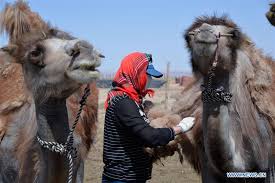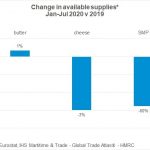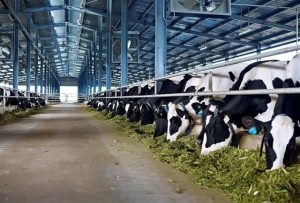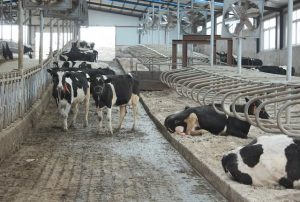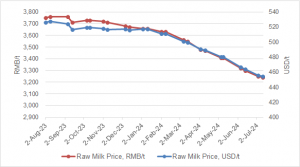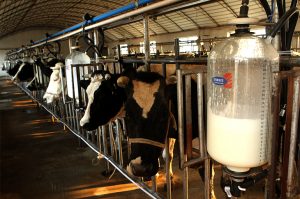
However, the number of camels dropped dramatically due to the development of modern transportation and the low economic benefits of camel breeding.
Statistics showed that the number of camels in Alxa League declined from 251,500 in 1982 to only 55,900 in 2003.
“The gestation period of a two-humped camel in Alxa League is as long as 400 days, and most of them give birth to a single calf. They usually become sexually mature at around five years old,” said Zhang Wenbin, a researcher of the animal husbandry research institute of Alxa League.
“The long breeding cycle and the low yield of camel meat led to the decrease of camel breeders in the 1990s,” Zhang added.
In August 2000, the former ministry of agriculture listed Alxa camels on the national livestock and poultry breed resources protection list and established a national reserve for camels in Alxa.
The situation began to change in November 2012, when the China Animal Agriculture Association officially named Alxa as “The Hometown of Camels in China,” and started to guide local herders to redevelop camel-related industries.
“When the league began to vigorously promote the camel milk industry in Alxa in 2015, only 2,000 female camels could produce milk at that time. After five years’ development, the number has increased to 11,000, with a daily milk output of 10 tonnes per day,” Zhang said.
Altanula has rich experience milking camels, but had only ever used the milk to make yogurt for his family. When the local government introduced a company in Alxa purchasing camel milk, Altanula seized the opportunity and began to sell his milk to the company.
“A kilo of camel milk goes for about 30 yuan (about 4.4 U.S. dollars), and the government will provide a subsidy of 10 yuan per kilo. A camel produces about 2 kg of milk a day. I can earn more than 10,000 yuan from a female camel each year excluding the costs,” the herdsman said.
Yonghong, also a local camel breeder, was registered as a poor resident in 2014. With the help of the local government, he jumped on the bandwagon of the camel milk industry.
“I used to sell camel hair and calves which brought me meager income. But the government helped me build up an 800-square-meter camel pen and taught me to provide better feed and tame female camels. I have more than 100 female camels, and they can generate up to 3,000 yuan per day for me,” Yonghong said.
There are more than 900 households raising camels and over 400 households producing camel milk, as well as 35 professional camel breeding cooperatives in Alxa. The annual output value of camel milk in the league has reached 160 million yuan.
Many camel milk companies said they have seen increased sales of camel milk this year due to the impacts of the COVID-19 epidemic.
“Many people became more health-conscious after the epidemic, while camel milk, boasting nutritional benefits, has now gained popularity in the market,” said Yan Xinlian, a camel milk dealer.
As of June 2020, there are a total of 131,400 camels in Alxa, accounting for one-third of the entire population of the breed across China. At present, Alxa is also developing camel milk derivatives, including cosmetics and camel milk ice cream. More industries covering policy, scientific research and marketing are also under construction.
According to a plan devised by the local government, Alxa will have 180,000 camels in stock by 2025, with an annual output of 640 tonnes of organic camel hair, 111,000 tonnes of camel milk and 4,000 tonnes of camel meat. The output value of the whole industry chain is estimated to reach around 1.8 billion yuan by then.
